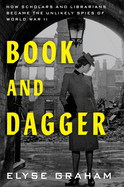
In her gripping fourth work of nonfiction, Book and Dagger, Elyse Graham uncovers the little-known story of the spies "who came in from the carrel": academics, librarians, and researchers whose expertise proved critical to U.S. intelligence work during World War II. Graham (You Talkin' to Me?) delves into correspondence, biographies, and other sources to chronicle the work of the Office of Strategic Services (OSS), whose Research and Analysis Branch relied on the work of academics transplanted from their ivory towers to the field.
Graham highlights individual agents, such as librarian and manuscript hunter Adele Kibre and Yale University professors Joseph Curtiss and Sherman Kent, who left their comfortable lives to search out key documents, cultivate sources, and manage other field agents. She explores the OSS's contributions to the work of resistance groups across Europe and to the efforts to track down hundreds of pieces of art stolen by the Nazis. Throughout, she emphasizes the peculiar ways academia had prepared these unlikely agents for their finest hours: it gave them the skills necessary to glean, compile, interpret, and synthesize huge amounts of information that proved crucial to winning the war. Graham shares anecdotes full of classic spy craft--cover identities, invisible ink, coded messages--but always returns to the intelligence, dedication, and unvarnished hard work that made OSS agents highly (albeit secretly) successful. In honoring scholars who "knew when to follow principles, not orders," Graham demonstrates the humanities' power to change the course of history and argues for its lasting value as a discipline. --Katie Noah Gibson, blogger at Cakes, Tea and Dreams

